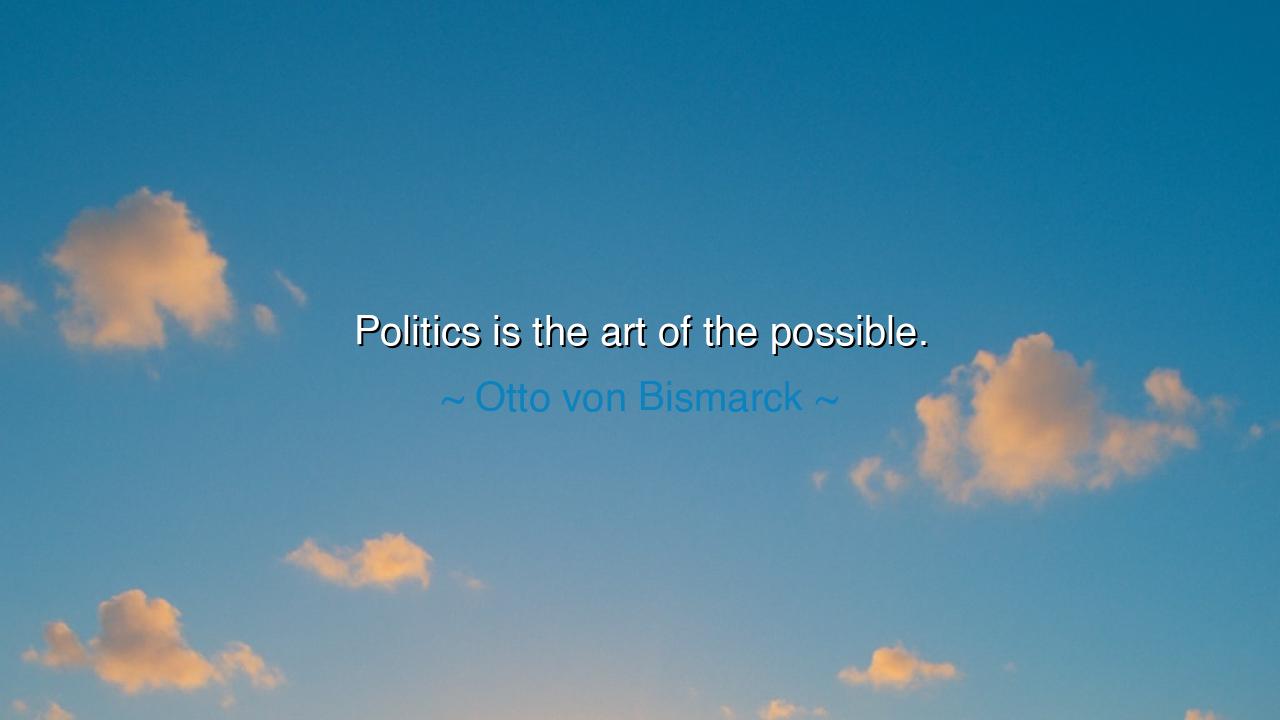
Politics is the art of the possible.






Hear, O heirs of nations, the words of Otto von Bismarck, the Iron Chancellor of Germany: “Politics is the art of the possible.” In this saying lies not despair, but realism; not cowardice, but the wisdom of knowing the limits of power. Bismarck, who united Germany from scattered states into one empire, understood that dreams without measure lead to ruin, but careful compromise and calculated vision can achieve what once seemed unreachable.
For politics is not the realm of pure ideals alone, nor of unbridled ambition. It is the art of balance, of achieving what can be gained while preparing the ground for what may one day be won. To call it the art of the possible is to recognize that human affairs are woven from the threads of will and circumstance, of vision and restraint. He who would govern must learn not only to dream but also to bend, to bargain, and to seize the opportunity when it arises.
Consider Bismarck himself. He did not seek to create a German Empire in one bold stroke; rather, he built it step by step, through diplomacy, alliances, and limited wars carefully chosen. He made peace when peace was wise, and struck only when victory was within reach. Had he sought all at once—had he demanded the impossible—he would have lost all. Instead, he gave the world proof that patience and prudence can carve empires.
History offers other mirrors. Abraham Lincoln, too, knew the art of the possible when he issued the Emancipation Proclamation. He did not abolish slavery everywhere at once but began with the states in rebellion, striking where his power could hold. Some called it half-measure, but it was the beginning of the end. The possible achieved in one moment paved the way for the impossible to be realized in another.
Therefore, let this wisdom endure: to govern is not to cling to perfection, but to move steadily toward justice and stability with what the moment allows. The art of the possible is not surrender, but strategy. For he who grasps the attainable today prepares the world for the greater victories of tomorrow. Bismarck’s words remain a torch for rulers and dreamers alike: in politics, wisdom lies in knowing the limits of power—and in using those limits to shape destiny.






YNyen ngoc
When Bismarck says that politics is the 'art of the possible,' it feels like a call to accept the limitations of the political system. But does this lead to complacency, where the real work of addressing systemic problems is neglected? Can we afford to just work with what’s possible, or do we need to challenge the status quo and push for what’s truly needed, even if it’s not immediately possible?
TTNguyen Thi Thuy
Bismarck’s view on politics being about the 'art of the possible' raises an interesting tension between realism and idealism. Is this a necessary approach to effective governance, or does it allow political leaders to avoid tackling the deeper, more difficult issues? How do we create an environment where politics can be both practical and visionary, addressing immediate needs while also working toward long-term change?
TVHuyen Trang Vu
Bismarck’s statement about politics being the 'art of the possible' reflects the reality of making decisions within a constrained environment. But in a world facing urgent challenges like climate change and inequality, how do we reconcile this pragmatic approach with the need for visionary leadership? Should politicians focus more on expanding what’s possible, or is it more important to make incremental progress within current boundaries?
NKLwe ngoc khanh
This quote suggests that politics isn’t about idealism but about working within constraints to achieve what’s feasible. In today’s polarized political environment, is this approach still relevant, or does it limit the potential for bold, transformative change? Should we accept that politics is about compromise, or should we push for more radical approaches that challenge the possible and try to redefine it?
NMhue nguyen mai
Bismarck's idea that politics is the 'art of the possible' speaks to the pragmatic side of governance. However, does this mean that political leaders are often constrained by the status quo? How do we balance practical solutions with the need for innovation and progress? Is it a strength or weakness in politics to accept only what is achievable within existing systems, rather than striving to challenge or reform those systems?